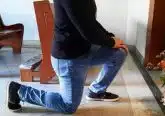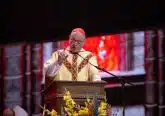Cardinal Dolan: AP report on paycheck loan program ‘misleading at best’
CNA Staff, Jul 15, 2020 / 06:01 pm MT (CNA).- Cardinal Timothy Dolan of New York has written a response to an Associated Press report that characterized Catholic participation in the federal Paycheck Protection Program as an “aggressive pursuit of funds.”
The July 10 AP story, authored by Reese Dunklin and Michael Rezendes, “was so inaccurate, and left such a damaging impression I felt it was important to set the record straight with you,” the cardinal wrote in a message to his archdiocese.
He called the article “scurrilous” and “heavy on innuendo,” and added that “many news outlets picked up the story, which implied that there was something amiss in Catholic institutions receiving paycheck protection money.”
The PPP is a $669 billion initiative that allows entities to obtain low-interest loans that can be forgiven if the money goes mostly to cover payroll expenses, and to keep people employed who are in danger of losing their jobs.
Cardinal Dolan wrote that the PPP “was designed to help employers continue to pay its [sic] employees when the economy went into lockdown in response to the coronavirus,” so as to keep people employed.
“Religious institutions were invited and permitted to participate, as they employ large numbers of people across the country,” he added.
“Here in the Archdiocese of New York, if you combine the number of fulltime employees in our parishes, schools, agencies, and central administration, there would be 6000 fulltime and 4000 part-time employees. Without assistance from the PPP, many of our employers would have had no choice but to lay-off their employees, reducing the church’s ability to assist people in need, and forcing our people to seek unemployment.”
Without the reception of funds from the PPP, “your parish’s secretary, or the teachers in your child’s Catholic school, for instance, could easily have lost their jobs,” the cardinal wrote. “So, the money did not go to ‘the archdiocese’ but to our workers.”
For Cardinal Dolan, a second problem of the AP article is its attempt “to make some sort of connection between the sexual abuse crisis that has haunted the Church, and the Paycheck Protection Plan assistance.”
He said the funds received by the archdiocese “was used solely … to continue to pay employees their salaries and benefits. Not one penny of that money was used in any way to settle lawsuits or pay victim-survivors of abuse. We have none of this money left. It has all be [sic] distributed to our workers, and the government is carefully auditing it.”
The cardinal’s third primary complaint was its sole focus on the Catholic Church, “making it seem as if Catholics are unique in participating in the Paycheck Protection Plan.”
“In fact, religious organizations representing all faiths participated in the program, as it was intended,” he said. “Nationally, the Small Business Administration approved over 88,000 loans for religious organizations, supporting more than 1 million jobs. Why then focus solely on the Catholic Church, unless the reporters had some animus towards the Church (which we suspect they do)?”
Cardinal Dolan said that “the overwhelming number of reporters with whom I have interacted have been dedicated to their craft, seeking to get the story right, and by and large the coverage of the Church has been fair – critical and honest when reporting on my mistakes, willing to report on positive developments as well.”
“This AP story, however, did neither. It invented a story when none existed, and sought to bash the Church.”
Archbishop Paul Coakley of Oklahoma City, chair of the US bishops’ committee on domestic justice, also wrote a response to the AP story, defending the use of the PPP by Catholic parishes, hospitals, schools, dioceses, and social service agencies.
“The Paycheck Protection Program was designed to protect the jobs of Americans from all walks of life, regardless of whether they work for for-profit or non-profit employers, faith-based or secular,” Archbishop Coakley wrote.
“The Catholic Church is the largest non-governmental supplier of social services in the United States. Each year, our parishes, schools and ministries serve millions of people in need, regardless of race, ethnicity or religion. The novel coronavirus only intensified the needs of the people we serve and the demand for our ministries. The loans we applied for enabled our essential ministries to continue to function in a time of national emergency.”
“In addition, shutdown orders and economic fallout associated with the virus have affected everyone, including the thousands of Catholic ministries — churches, schools, healthcare and social services — that employ about 1 million people in the United States,” Coakley added.
“These loans have been an essential lifeline to keep hundreds of thousands of employees on payroll, ensure families maintain their health insurance, and enable lay workers to continue serving their brothers and sisters during this crisis.”













